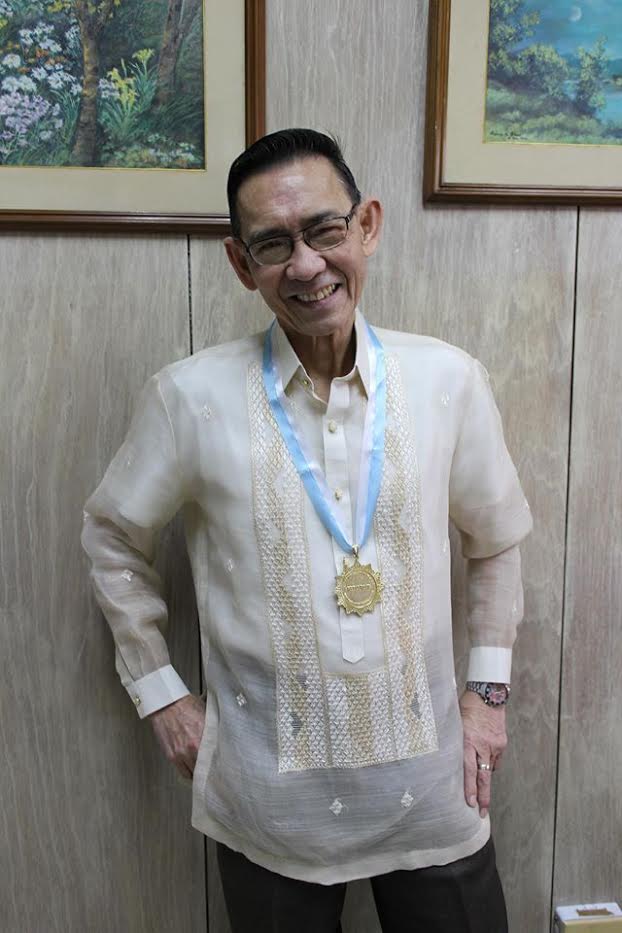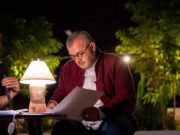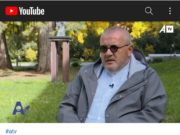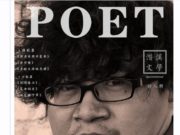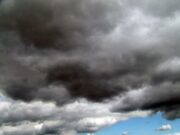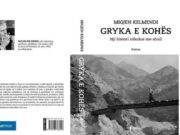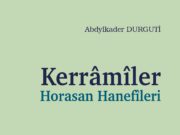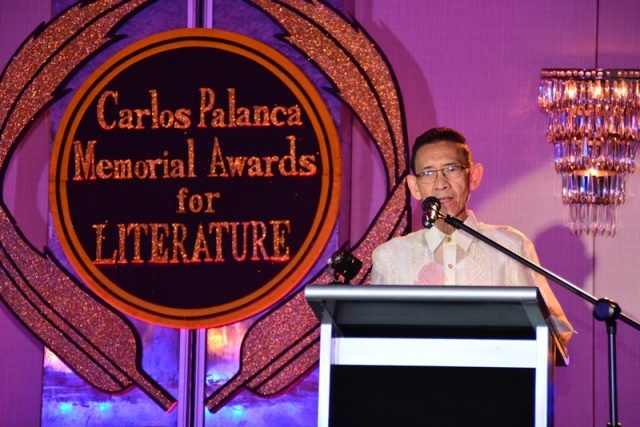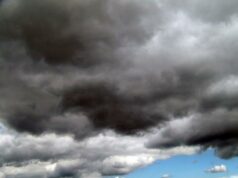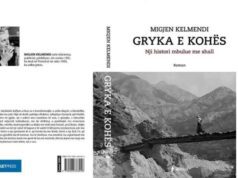Abad is a multi-awarded poet, essayist, fictionist and editor of several landmark literary anthologies and books that chart the history of Philippine literature in English. He has also won the Palanca Awards many times in the Poetry in English category, alongside other literary accolades such as the National Book Awards by the Manila Critics Circle, the Gawad Pambansang Alagad ni Balagtas and the Patnubay ng Sining and Kalinangan from the City of Manila, among others.
Language is the soul of a culture
Dr. Abad also extolled on language being the essence and soul of a culture, and that writers are committed to forge and reinvent it for the latter to survive: “He must work the language even as the farmer works the soil to produce his crop; as the writer works the language, he might also note that the ground of the language he employs is his people’s culture and history, their day-to-day living in their own time and place.”
Using poetry as the embodiment of all kinds of literary work, Abad told the audience of its importance in the culture of all humanity. “The poem, the literary work, is a verbal artifact, its soul or inner form is its meaningfulness from reader to reader. On its own terms, the poem, the literary work is already an interpretation of a human experience.”
http://ncca.gov.ph/gemino-h-abad-pays-homage-to-language-and-literature-and-the-power-of-imagination/
http://www.sushidog.com/bpss/stories/fidelity.htm
http://www.sushidog.com/bpss/stories/fidelity.htm
Gémino H. Abad (1939 – ), University Professor emeritus of literature and creative writing, is a poet, fictionist, and literary critic and historian, with various honors and awards. In 2009, he received Italy’s Premio Feronia (“Foreign author category”) for his poetry, later translated and published as Dove le parole non si spezzano (Roma: Edizioni Ensemble, 2015). Where No Words Break (2014) is his tenth poetry collection, and Past Mountain Dreaming (2010), his ninth collection of critical essays; he has two collections of short stories, Orion’s Belt (1996) and A Makeshift Sun (2001). He is known also for his three-volume anthology of Filipino poetry in English from 1905 to the 1990s – Man of Earth (1989), A Native Clearing (1993), and A Habit of Shores (1999); and a six-volume anthology of Filipino short stories in English from 1956 to 2008 – Upon Our Own Ground (2008), Underground Spirit (2010), and Hoard of Thunder (2012). He obtained his Ph.D. in English at the University of Chicago in 1970, and continues to teach at U.P. where he has served as Secretary of the University, Vice-President for Academic Affairs, and Director of the U.P. Creative Writing Center (now an Institute).
‘THE BOOK OF EMBRACES’
I’m vexed with myself tonight
that I, fitful tiller of words,
cannot write you a poem,
warm as your ironing-board,
well-shaped like your finest vase,
which should tell everlastingly your truth
clear like any ordinary morning
when the smog lifts to wide-open skies.
What is your truth, or what is love?
Where you move without ripple in my blood,
there the clods of deep little hurts –
oh, forgiven, nameless in memory,
and yet, without my conscious intent,
let to grow like thorny touch-me-nots
and rankly creep with tiny purple eyes
to demean me darkly in my sight.
How their bramble cut my soul
where I would not look to save myself!
Why do I struggle toward your truth?
[cont.: NEW stanza]
Where words and words swirl about,
dust in my speech, without power
to trace their meaning in my blood,
I coax like a conscientious gardener
from dead clods their hurtful bloom,
then look upon my soul’s wildness
that you had loved, and strain
from our days’ erasure of worship,
syllable by syllable,
the struck bliss and dazzle
of our secret ‘book of embraces.’
NOTE:
Re the poem’s title: let it be in single quotes: ‘The Book of Embraces,’
because it is the same title of a work by Eduardo Galeano.
Care of Light
As soon as it gets dark, I turn on the lights
in my old professor’s cottage, and the following
morning before office, turn them off again.
With one key I open the iron gate, and with two,
the main door. I turn the lamp on in her library,
the vigil light for the Sacred Heart on the shelf
jutting out a wall; then I switch on the single
electric bulb outside the kitchen, and last,
the little red and green Christmas lights
below the front eaves.
I follow strictly her instructions.
She loves order in her life, and requires
a similar order in other people’s behavior –
a discipline of mind sometimes terrorized
by the haps and hazards of thieving time.
She needs to be always in control,
but she’s old now and frail, can hardly walk,
deaf and half-blind, and often ill, so that,
having no choice, no housemaid able to endure
her sense for order, she had to leave
and stay at her sister’s place,
finally dependent.
In the half-darkness and mustiness now
of her deserted cottage, all its windows closed,
her books and papers, once alive with breath
of her impetuous quests, are filmed with dust
on her long working table, awaiting it seems
her return.
I think of how a time ago [cont.: NO stanza]
she’d walk briskly to her early morning class,
dressed in style to shame old maids; then call
our names as though each had irreplaceable
post in her invincible order of things;
and then, her shoulders hunched, teach
with a passion that, before the imperious gale
of her questioning, drove us bleating
on the open plain of the world’s sharp winds.
So; at the day’s end,
I’m her lamplighter on her silent asteroid,
among books, papers, rubble of chalk.
I close the gate behind me as I stride out,
making sure I hear the lock’s tiny click.
I follow strictly her instructions.
Down her street the street lamps cast
my shadow ahead. Crickets in the bushes
whirr according to their nature.
In the same order, the sun too will rise
tomorrow, and I shall be back.
How Our Towns Drown
How in the downpour our towns drown,
downstream of doom to sea we are returned,
houses and pigs in ceaseless procession
as skies boom and fall thundering spears
to beat down all curses and tears to tide –
among seaweed and driftwood and water hyacinths,
prayer-wreaths for the dead and the drowned,
downstream of doom to sea we are returned.
Tottering over manholes, shivering in the blast
of a blind monsoon, its hollow howl
the rolling dreariness of our emptied hills,
our feet doubt their ground where streets
vanish in the gorge and swill of slime –
to flood at last we are flotsam and scum,
houses and pigs in ceaseless procession.
And rushing past our brethren, those lovelorn
cats and cockroaches, amid floating roofs,
lumbering cadavers of cherished scrap,
our naked brats scamper and gambol
over their scavenged loot of murky things,
tires and handbags and bottles and shoes,
[cont: NEW stanza]
as skies boom and fall thundering spears
on Cherry Hill slumping down its slope
and shoveling homes in one boulder swoop –
landfill of families in moaning mud!
so sudden, their screams no echoes bear,
abducted to questioning rage of mind
by what “state of calamity” or “act of God”
to beat down all curses and tears to tide.
Antipolo to Pangasinan the earth rivers
and shoves down Pinatubo’s renegade ooze
to our paddies swelling to ocean of muck
and fishponds collapsing to swamp;
for bridges are down, and mountains too far,
to flee and shelter from the water’s gore
among seaweed and driftwood and water hyacinths,
what word, what route? what water world
for breathing space, the floors of our dreams
but shiver their fittings and leak their gloom.
Clutch of seaweed for hair,
driftwood for limbs, hyacinths for a cloak,
what new indigene, only survivor to offer
[continue: NEW stanza]
prayer-wreaths for the dead and the drowned?
Requiescant in pace … vitam aeternam,
so cradle the infant, swaddled in rubble grime,
just now excavated and no mother to hush
its lost wail, no father, no sibling –
surely now their wreck is deaf to cranes
or fingers digging, to what end any change
how in the downpour our towns drown.
[Note: Last line is a single stanza]
I Teach My Child
I
I teach my child
To survive.
I begin with our words,
The simple words first
And last.
They are hardest to learn.
Words like home,
Or friend, or to forgive.
These words are relations.
They are difficult to bear;
Their fruits are unseen.
Or words that promise
Or dream.
Words like honor, or certainty,
Or cheer.
Rarest of sound,
Their roots run deep;
These are words that aspire,
They cast no shade.
These are not words
To speak.
These are the words
Of which we consist,
[cont.: NO stanza]
Indefinite,
Without other ground.
II
My child
Is without syllables
To utter him,
Captive yet to his origin
In silence.
By every word
To rule his space,
He is released;
He is shaped by his speech.
Every act, too,
Is first without words.
There’s no rehearsal
To adjust your deed
From direction of its words.
The words are given,
But there’s no script;
Their play is hidden,
We are their stage.
These are the words
That offer to our care
Both sky and earth,
[cont.: NO stanza]
The same words
That may elude our acts.
If we speak them
But cannot meet their sound,
They strand us still
In our void,
Blank like the child
With the uphill silence
Of his words’ climb.
And so,
I teach my child
To survive.
I begin with our words,
The simple words first
That last.
Jeepney
Consider honestly
this piece of storm
in our city’s entrails.
Incarnation of scrap,
what genius of salvage!
what art or craft, what cunning.
Its crib now molds our space,
its lusty gewgaws our sight.
In rut and in flood,
claptrap sex of traffic,
jukebox of hubbub –
I mark your pride of zigzag
heeds no one’s limbs nor light.
I sense our truth laughing
in our guts, I need
no words to fix its text.
This humdrum phoenix in our street
is no enigma.
It is a daily lesson of history
sweating in a tight corner.
Its breakdowns and survivals
[cont.: NO stanza]
compose our Book of Revelation.
It may be the presumptive engine
of our last mythology.
Look, our Macho Incarnate,
sweat towel slung round his neck.
He collects us where the weathers
of our feet strand us.
His household gods travel with him,
with the Virgin of Sudden Mercy.
Our Collective Memory, he forgets
no one’s fare. Nor anyone’s destiny.
See how our countrymen cling
to his trapeze against all hazards.
All our lives we shall be acrobats
and patiently survive.
Our bodies feed on proximity,
our minds rev up on gossip.
We flock in small spaces,
and twitter a country of patience.
Here is our heartland still.
When it dreams of people,
it returns empty to itself,
[cont.: NO stanza]
having no power of abstraction.
Abandoned to itself,
and in no one’s care,
jeepneys carom through it,
our long country of patience.
Nights I lie awake, I hear
a far-off tectonic rumble.
Is it a figment of desolation
from that reliquary of havoc,
or, out of its dusty hardihood,
that obduracy of mere survival,
a slow hoard of thunder
from underground spirit of endurance?
THE LIGHT IN ONE’S BLOOD
To seek our way of thinking
by which our country is found,
I know but do not know,
for its language too is lost.
To find our trail up a mountain
without a spirit guide –
here is no space where words in use
might stake a claim.
Speaking is fraught with other speech.
Through all our fathers, Spain
and America had subtly wrought our souls
and ravished our land and history.
How shall I think counter to the thick
originating grain of their thought?
“I have not made or accepted
their words. My voice holds them at bay.”
Look then without words,
nor jump about like ticks
missing their dumb meat.
If there be enough blood yet
in our story for counterpoise,
in speech take no meaning
from elsewhere,
be more thorough than passion.
[cont.: NEW stanza]
Whence does one come
when he speaks, his eyes lighting up?
Before speech, all words are dead,
their legends blind.
No one comes from language,
the truth is what words dream.
One speaks, and language comes,
by the light in one’s blood.
What ravening lions roar
in our blood for our thoughts?
We too have our own thunder
from lost insurrections;
even the present seems a gift,
though mostly unopened.
So much thought is scattered
like grain upon burnt ground.
The soil is ours, and inters
the secret bones of our loss.
We must know our loss, all things
that ghost our time.
Speak now, collect every bone,
lay the pieces together.
Here is true speaking,
a mountain rises beneath our feet!
Is not language already given?
– yet we have its use:
a double forgery!
[cont.: NO stanza]
No essences are fixed by words.
Proceed by evacuation
of first seeing; in emptiness
gather the pieces
of breaking light.
No language is beforehand
but its shadow; nothing there
in the script, but the others’ myths
that now fret your soul.
What breathed there before the words
took their color and creed?
How, with the same words,
shall another tale be told?
The same words, yes, but not the given,
for void its speech of empire!
Our eyes must claim their right
to our landscape and its names.
What cataract of other minds
has flooded their sight?
We must even fall from our own sky
to find our earth again.
Parable of Stones
Every time I go into
the world’s morning, my pockets
are full of stones.
You cannot see them
where my hands are hid
sometimes bruised by their edge.
And a quick and deadly aim
I have, and ask no questions.
My hands are cold.
And few stones left have I
at each day’s end,
and groan as my hands bleed.
My state – who can endure?
As morning breaks I know again
I have more stones to cast.
[cont.: NEW stanza]
You cannot see them
where my hands close
and all my days bleed.
Who will close my morning,
O, who will empty
my pockets of my stones?
Taking My Soul to Account
This is an accounting, and I will not,
I will not, go gentle with you, soul,
whoever you are, insider of me,
pre-empting and defining me always
to myself, and I cannot gainsay it.
I regret there shall be no peace
between us unless you yield.
What universe did you fill, soul,
before you found my hovel?
What was it made you think
that I might be companionable?
I can’t recall how we were introduced;
I believe I’m often civil, and smile
like a fool through every discomfiture.
How our relationship has endured!
Reviewing our curious history, I find
that lacking the skill to feign a pure
motive for my action, I’ve been cunningly
caught in a corner where you mock.
My underground spy, I know your suit,
I’ve glimpsed your ploy, I’ve caught your
dazzling act. (cont.: NEW stanza)
When I was young I had no language
to fabricate a special grammar and syntax
to my need which, soused with the brew
of feeling, tore things open and broke
a young girl’s heart. I hadn’t reckoned
from those hurts and wrecks you’d draw
the alphabet to spin my speech to myself.
Now your voice runs rings round
my words, and I cannot gainsay it!
You leave me no choice in the matter.
You are greedy, soul, but I shall act
the rebel to your play, and smile to wrap
the murder in my thoughts with the same
words that root and flower in your field.
Oh, the same words! for in the world’s
long night, I am too their homestead!
By their light, I lose the force and color
of my deed, and my proud solitude suddenly
empty, find this book of accounts
quite silly, too self-regarding –
Do I not see your hand again in that reprise?
What shall I do with you, soul,
dead ringer of me, with too sudden meaning
[cont.: NO stanza]
which mines that which I would do
and blasts my every move to run counter
and encompass your will with mine?
How acquiesce with grace in my own rout?
You must supply the cord to my hanging!
For it appears I only live as you will,
yet still, as my night’s slant-eyed harlequin
heats my blood, I shall invent other ruses
to circumvent again your customary guile.
I do not think you can always run my days
without breaking stride. There, where
once you falter, I shall break your speech.
THAT SPACE OF WRITING
And when I write, I want the largest space,
Of such breadth, of such length as this world
Never had of forests nor virgin paper,
Where the words never were, their script accursed,
but only now
Descending to cry, Freedom!
Then my hands should never feel there were walls
That grow their ominous lichen between my fingers,
Nor my elbows graze the wild beards of rocks
That cathedral my tribe wailing for their god,
but only now
Descending without speech!
The words that never were create anew my race,
Their mornings stand clear where ancient skies cascade
Down the singing gorges of the wind. My hands
Draw again the map that alien voyages had wrecked,
O long ago
Descending with Cross and Krag!
[continue: NEW stanza]
My elbows swing where rooms void their space,
And I laugh to see the weird syllables of speech
Open their abyss, and stride across the heartland
Of my people’s silences where their eyes pour
like sunlight
Descending to claim the earth!
O when I write again, the words of any tongue
Shall find no tillage in our blood, nor my hands
Scruple to choke their weed, for first must they bleed
Their scripture in our solitude and yield to our
scythe’s will
Descending to carve our heart.
WHERE NO WORDS BREAK
(After People Power Revolution, 22-24 February 1986)
Where no words break
I thirst no longer for truth,
am very still, at peace.
Time was
the truth was future perfect,
but I no longer seek,
all my pieces I have collected
and let no words break
Where no words break
my thirst is quenched
by every spring,
the spring is everywhere.
Time was
I strove for truth,
the passion grew,
but words could not appease.
Truth had no bounds
and let no words break
[continue: NEW stanza]
The President whose State was a Lie,
the soldier who did not fire,
people shouting, words dying …
Or fruit of achiote,
snails after, things swarming …
Once these were truth’s sundries,
its daily exhibits,
but did not make a book
where no words break
I thirst no longer for truth,
Am, without words composed.
Our ticks have lost their itch,
the tocks of doom have grown serene,
I no longer even roam
where no words break


